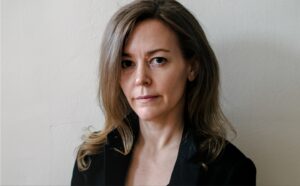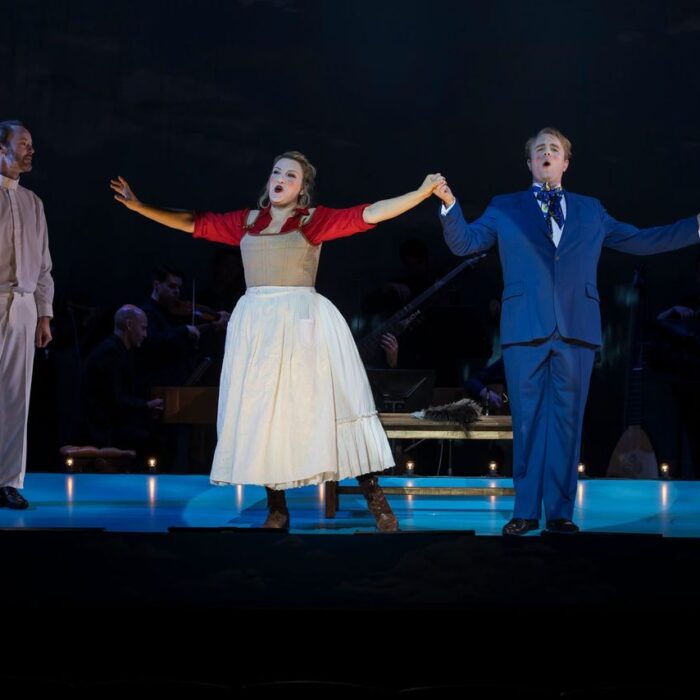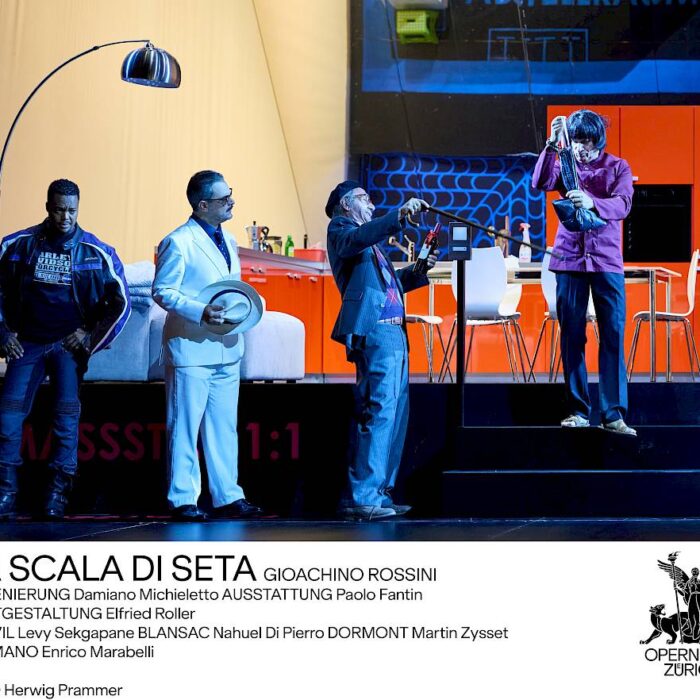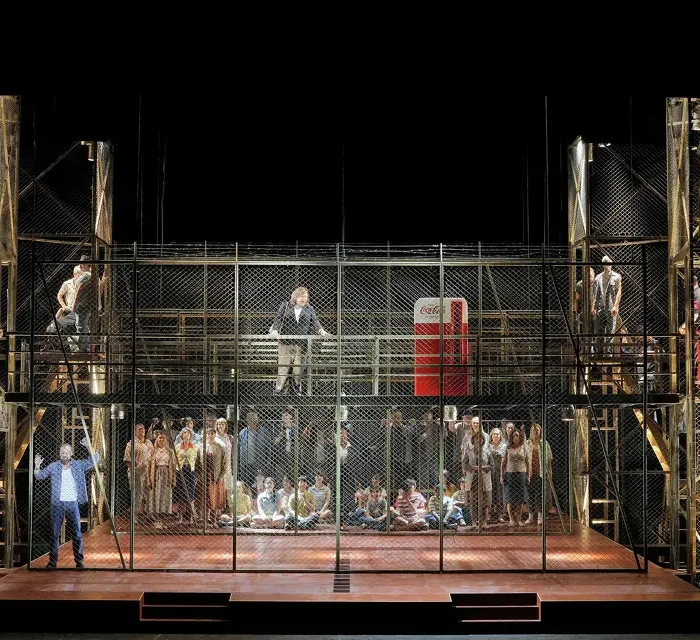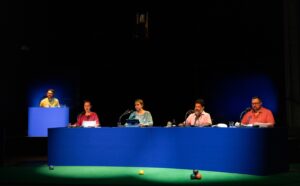
Roulette Intermedium 2025 Review: Celestial Excursions
Robert Ashley’s Mesmerizing Opera Creates Musical Space for Conversations Pertaining to the Beyond
By Jennifer Pyron(Photo: Whitney Browne)
“Celestial Excursions” by Robert Ashley was featured at Brooklyn’s Roulette Intermedium Sept. 10-12, 2025 and was commissioned by Performing Artservices, Inc. as part of the national series of works of Meet the Composer/Arts Endowment Commissioning Music/USA, which is made possible with support from the National Endowment for the Arts, the Helen F. Whitaker Fund, and the Catherine Filene Shouse Foundation.
The cast included Gelsey Bell, Kayleigh Butcher, Mario Diaz-Moresco, Brian McCorkle, Paul Pinto, and an electronic orchestra by Robert Ashley and Tom Hamilton. The music and libretto are by Robert Ashley and OperaWire recently visited in an interview with Mimi Johnson of Performing Artservices to learn more about Ashley’s process and the opera. This review is of the opening night performance on Sept. 10th.
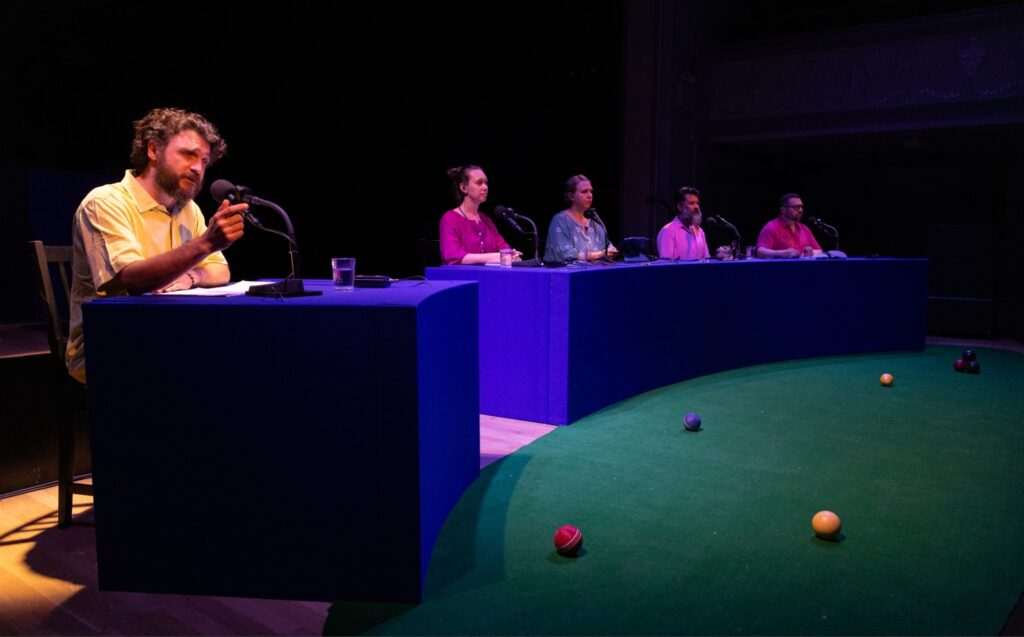
(Photo: Whitney Browne)
Production Details
The opera, “Celestial Excursions,” features music and libretto by Robert Ashley with musical direction, sound design, and live mix by Tom Hamilton. The electronic orchestra features Robert Ashley, Tom Hamilton, and piano embellishments in Act one and Act three by “Blue” Gene Tyranny. Lighting and stage design for this production featured work by David Moodey and included a long blue paneled set with a green “turf” stage floor with pool balls strategically balanced on top. The singers were seated behind the long blue panel as though at a desk and ready to work. They each had a microphone and the “Celestial Excursion” score in front of them, some in hand. There was a single wooden chair suspended high above the singers and towards the back of the stage that was without a spotlight, but always in the back of one’s mind.
This opera is focused on “the now” and requires the performer and the listener’s utmost attention, making it a meditative practice of alternating speech patterns and vocal inflections patterned perfectly to the tempo of the electronic orchestral score. The overall effect of most of Ashley’s operas is mesmerizing, a lulling journey into one’s own psyche as guided by Ashley’s repetitive repertoire. For me, “Celestial Excursions” stands out from the other Ashley operas I have experienced live before, which include “Improvement (Don Leaves Linda)” (2019) at NYC’s The Kitchen, and “eL/Aficionado” (2021) and “Foreign Experiences” (2024) at NYC’s Roulette Intermedium. This difference was influenced by my conversation with Producer Mimi Johnson prior to the production, where I learned more about the complexity of Ashley’s composition process and the personal background behind his work. This added layer of emotional depth and wisdom created a sense of levity and resolve for me that has changed my “listening life.”
“Celestial Excursions” illuminates the reality of one’s own mortality, unlimited in its purpose of seeking a dignified end, to inspire the creation of a new beginning. And this is exactly what Ashley’s work is doing for opera today.
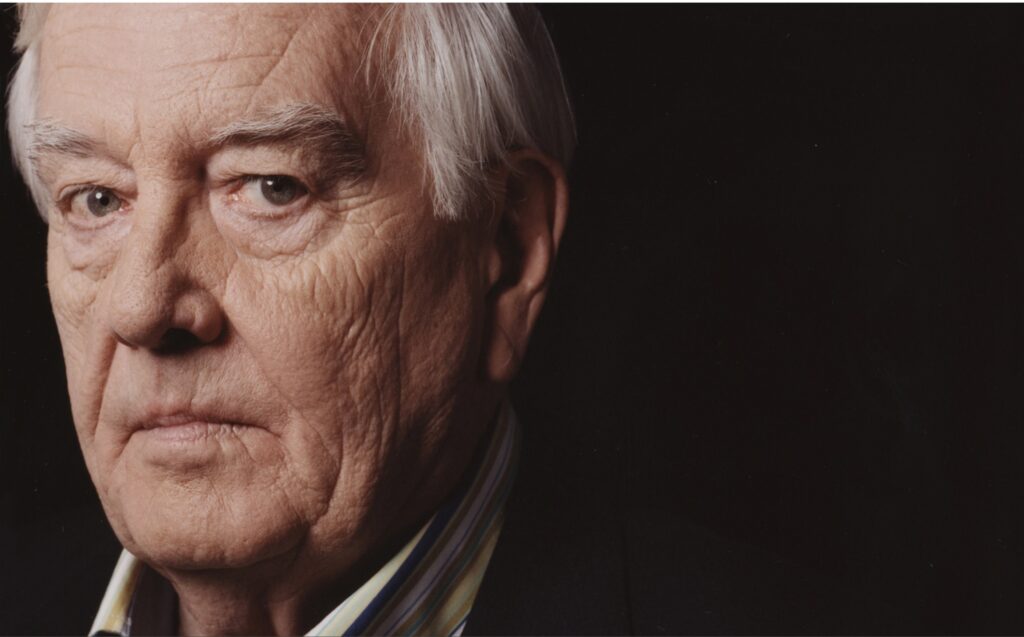
(Photo: Joanne Savio)
The program’s opening page began with a note by Robert Ashley from 2003: “The fear is that we won’t go gently or abruptly into that good night. We will hang on in the endurance trials of old age, forever rehearsing in the early morning twilight, fortified by a few hours of faulty sleep, the plot or why there is no plot, the explanations, the why, the lists, the old grievances never to be settled now, the stories never told or passed on, the interruptions, the terrifying proportions, everything larger than it is known to be, distorted in the mirror, and again and again. Old people are special because they have no future. The future is what to eat for breakfast or where did I leave my shoes. Everything else is in the past. Is this understandable?
So, sometimes old people break the rules. Especially the rules of conversation and being together. They laugh a lot. I mean real full laughter. Did you ever notice that? They break the rules because, for one reason or another (illness, anger, damage, enough of that, whatever), the rules no longer apply to them. They are alone. Sometimes they are sad. Sometimes they are desperate. Mostly, they are brave. Mostly, they have given up on the promises of religion – life after death, immortality, etc. Mostly, they are concerned with dignity. Living with dignity. And, like all of us, eventually dying with dignity. But they are still obliged, as human beings, to make sounds. They are obliged to speak – whether or not anyone is listening.”
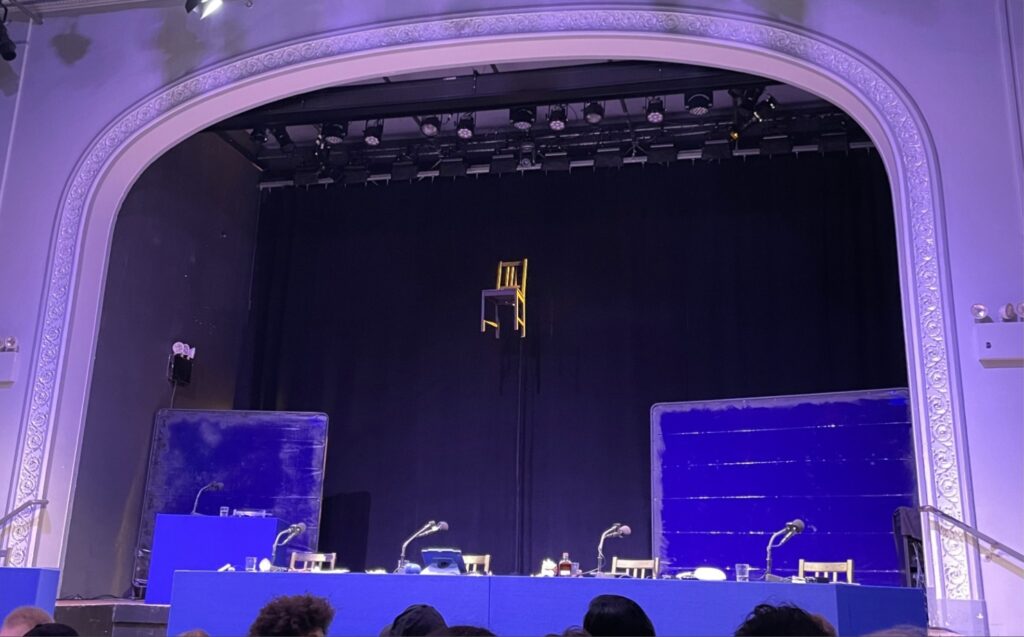
(Photo: OperaWire)
Illuminating Cast & Musical Highlights
“Act one (‘Is It Light Yet?’) is a series of personal songs, the kind rehearsed in the early morning, every morning, to try to get the story right. These are separated by short bulletins of what some of the rest of the people on earth are up to.”
Kayleigh Butcher as Characters (Gelsey Bell sings along with Butcher as she speaks) begins the opera, talking out loud about passing thoughts and investigating the imagination of thought. Butcher and Bell do an excellent performance, incorporating the multidimensional layers of processing speech patterns, reacting to the thoughts with more thought, and responding in “consciousness” to address the thought. In this opening, I visualized Ashley processing these exact speech patterns and the flow of his thoughts in a manner of capturing the essence of conversation. I realized that I was listening to the documentation of this process as the score itself was being delivered by the singers, who were mostly improvising. Yes, Ashley’s works require improvisation by the performers, but his genius in compiling intimate layers of spoken word depicting the “looping” of the thought process is unmatched by anyone. No one can do for opera what Ashley has done in this way, making recitative speech-like both phonetically and reasonably. He makes internal thoughts loud enough to be an external sound dialogue–manifesting into a body of sound itself.
The electronic orchestra shifts tonal perspectives to keep the momentum of the opera flowing forward in this same vein, and between the voices of Brian McCorkle, Paul Pinto, and Mario Diaz-Moresco, there is a percussive notion that beautifully highlights the voices of Kayleigh Butcher and Gelsey Bell.
Paul Pinto’s voice, especially during ‘Mr. or Ms. or Mrs. N’ was illustrative in its delivery, making it easy for listeners to relax into his cadences and descriptive text. His voice was warm and inviting as he cascaded down the storied path of ‘Mr. or Ms. or Mrs. N.’
Brian McCorkle’s voice during ‘Love Letter, Part 1’ alternated with “Blue” Gene Tyranny’s piano embellishments perfectly. This might have been my personal favorite part of the opera, especially when Mario Diaz-Moresco’s voice interjected with vocal proclamations before ‘Love Letter, Part 2’ began. Moments like this intelligently compartmentalized the thought process with a musical throughline that perpetually created momentum and made this opera evolve over time. This is another point as to why it’s my favorite one thus far.
The phrase repeated in this moment still resonates in my mind: “How special you are, no one can see. But, I’ll keep it a secret…how precious you are.”
Gelsey Bell’s voice during ‘Raoul’ was excellent in its pronunciation and tonal inflections. At moments, her mic was amplified with reverb, and her voice filled Roulette’s hall with a flourishing brilliance. Her accent gave life to the story about Raoul and his childhood of feeling tortured by the unseen. She made sense of the “beyond” in this moment.
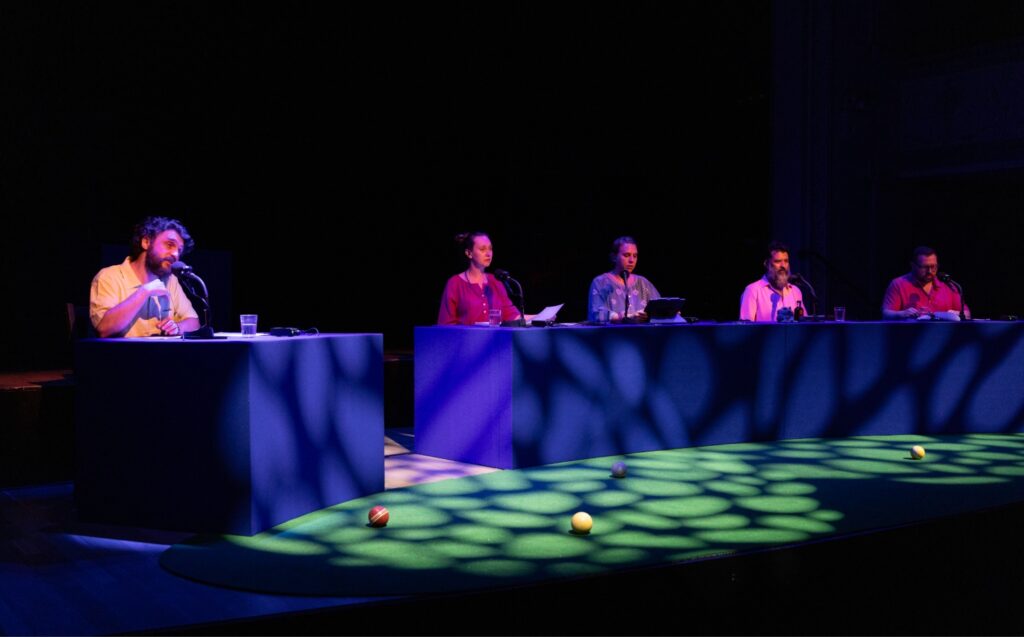
(Photo: Whitney Browne)
“Act two (“Asylum”) is a dialogue between four guests at the Assisted Living Facility and the counselor, who is trying to explain to them that the burden they feel, which might seem to be explained in words, is not to be relieved by finding the word of escape, and in fact will never be relieved. Occasionally the guests break into song to relieve the tension.”
Brian McCorkle is the voice of Asylum. The Songs are performed by Bell, Butcher, Diaz-Moresco, and Pinto, including ‘The List,’ ‘Depression,’ ‘What About the Kids?,’ ‘Baguette,’ ‘I LoveThat Stuff,’ ‘I Had It and I Lost It,’ ‘Recent Attendance,’ ‘After Allthe Stuff,’ ‘Ghosts,’ ‘It’s Got To Be a Secret,’ ‘It’s Only Fun,’ ‘I Like Q,’ ‘Good Idea,’ ‘Never on Your Mind,’ ‘It’s Almost 10 O’Clock Kids,’ ‘Ordinary Man,’ and ‘Years of Desire.’
Act two dives deeper into the “beyond,” as mentioned before, about the mental state of those in asylum and how their thoughts spiral into questions dramatized by radical stories and ultimate questions that must be answered. The stories create a compilation of tangents, materialized into words and songs. This was a team effort with all voices on deck and when the voices were amplified in reverb, it was magical! There was also a comic relief point made during the song ‘It’s Almost 10 O’Clock Kids,’ and everyone in the audience (old enough to remember) was reminded of how local television stations would ask parents at ten o’clock if they knew where their children were.
“Act three (“The River Deepens”) is a series of reminiscences in a mixture of past and present tense. The importance of the reminiscence is its persistence. Separations never heal. Friendships misused never forgive. A mistake is a mistake forever.”
Brian McCorkle told the story of ‘Ozzie Smith.’ His voice’s gentleness, when combined with the other singers’ voices singing the phrase “the love was pouring down like rain,” was soothing and enlightening. The story ended with the imagery of Ozzie Smith staring at a baseball for ten minutes and crying, for the love of the game and the witnessing of a miracle–all captured on television, of course.
Afterwards, another captivating series of piano embellishments by “Blue” Gene Tyranny highlighted the electronic orchestra’s score. It was like a breath of fresh air to listen in this moment, letting the story of Ozzie settle into the audience’s mind before moving on.
Gelsey Bell’s voice in ‘Therapy’ was surrounded by the voices of all the cast as she told the story of her life during a therapy session–for a fee, of course. The desperation in her voice evolved into the realization of a “cold, cruel world” and became grounded as she spoke about moving forward and ushering her thoughts “into the fresh light.” Ashley interwove alternate perspectives in ‘Therapy’ surrounding this one story and how one can experience therapy in a loop as the “river deepens when it gets down to the sea.”
Mario Diaz-Moresco performed ‘Nightmare’ with precision and care, especially when telling a long story about car troubles alleviated by a beautiful night in the desert. Paul Pinto’s voice for the second-to-last song, ‘Grandmother,’ portrayed the story of his grandmother’s house and how he remembered her and her house burning down, exploding. Pinto’s pure tenor resonated effortlessly above the other singers in the hall, leading into Kayleigh Butcher’s voice for the final song of “Celestial Excursions,” ‘Yes, I Know.’ The close of the opera trailed off into the final phrase, “the river deepens when it gets down to the sea, the river deepens.”
